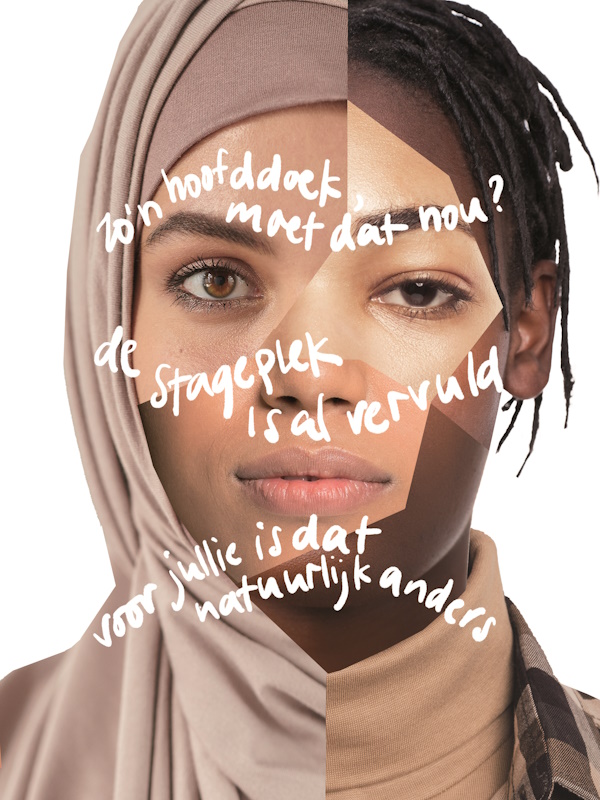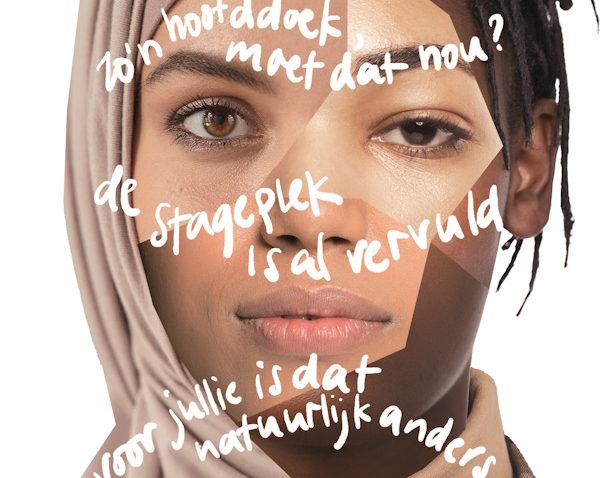At Windesheim in Almere, more than half of the students experience discrimination during their internship, according to research conducted by Diversity and Inclusion advisor Hanan Nhass. Nursing teacher Anja van den Berg recognizes that image. But the victims prefer not to talk about it. They believe that this silence must be broken.

It was a modest study, the results are mainly indicative, but interesting enough, Hanan Nhass emphasizes. Internship discrimination is common. Anja van den Berg thinks that everyone has experience with this or has heard about it. ‘It’s a Windesheim-wide problem, I’m sure. I can’t imagine that only the students at G&W (Healthcare & Welfare) have to deal with it. Every student population will experience different problems, you have to look at this per domain or per course. But the problem is certainly there.’
However, in most cases it is not reported. Van den Berg: ‘We have no insight into it. There is a lot of attention for this, but what exactly is going on? Nobody knows that.’ This “underreporting” is mainly caused by students blaming themselves too quickly and too often. That pattern must be broken, says Hanan Nhass:
‘Students who face exclusion, prejudice and discrimination during their internship should know that it is not necessarily their fault. I want them to deal with such incidents in a healthy way. That they can identify these situations and discuss them. That is very difficult; it’s difficult for adults, let alone students. Bringing up something like this is very difficult, especially if you still have to be assessed. Another factor is that no one wants to be a victim. But we need to move towards a situation in which it is normal to discuss internship discrimination. Without being blamed for it being your own fault. The culture won’t change if everyone keeps their mouths shut.’
The boundaries are of course vague. When is it joking, when does it become teasing, bullying, or real discrimination? Then you soon start to doubt yourself.
Nhass: ‘The boundaries are very difficult to indicate. Internship discrimination is a form of transgressive behavior. Boundary crossing occurs when your boundaries are exceeded. This often gives a bad feeling. There is no objective measuring stick: it is about the student’s experience. This often concerns suspicions, because in most cases the person who discriminates does not make this explicit. When I talk to students about this, I say: if it doesn’t feel okay, then
it’s not okay. Of course, you can’t attend to every detail, but you have to be able to set and monitor your boundaries. That’s super difficult, especially when you’re young. That is why we want to pay more attention to social resilience within the internship preparation subjects.’
Can you give an example where a manager really crossed the line?
Nhass: ‘A manager had a perfume with her and went around to all her colleagues to spray it on them. But when she came to an intern of color, she didn’t and said something like: it doesn’t work well on your skin. That is of course extremely insulting, grating and obviously racist. But much more often it is beneath the surface. For example, when you feel like you are not being heard or not being taken seriously, for example because of your skin color or gender identity.’

Van den Berg: ‘It’s often small things that can be very annoying for the other person. One student, a Muslim woman, said that she had been discriminated during her internship, she had encountered misunderstandings. She found that the guidance provided by her work supervisors was very difficult. It was about wearing a headscarf, something that was part of her faith. The headscarf itself was allowed; the point was that she were asked about it in an unpleasant way – it was not overt discrimination, but they asked those, I call them ‘passive-aggressive’ questions. She also did not feel well supported by her supervising teacher. And another important point: from her culture she is used to being reserved and modest. (I think this is the same for many students from a different cultural background.) She also encountered this during the internship. She was too modest, etc. As a result, she had received a failing grade.’
The course assumes that students will speak up.
Van den Berg: ‘And then we are not sufficiently aware of the fact that we ask students things that they cannot simply conjure up.’
Sometimes employees within a company or organization simply do not realize what they are doing.
Nhass: ‘Then it can help to say something about it. There is generally a good response to this. But it is also possible that the reaction is one like: here we go again! What am I allowed to say?! And then it is very difficult to remain assertive. As an intern you don’t want to be a burden to anyone. You just want to complete your internship and certainly not suffer any study delays. Interns just let it happen and let it wash over them.’
And outsiders often say: don’t worry about it! You’ll be gone soon!
Nhass: ‘But then we probably underestimate what something like that does to a student! Moreover, we normalize prejudices, exclusion and discrimination and that is precisely what we should not do. Nothing will change for the intern who comes next. In this way we unintentionally maintain an unhealthy situation.’
Van den Berg: ‘Discrimination can certainly negatively affect study results. But that touches on many points. What have you experienced? What are your thoughts on it? What about the self-stigma of the people this happens to? Have we made our education sufficiently inclusive? Are the tests made in a way that people with a different background can also pass them? This is not yet being looked at sufficiently. Currently it is a hot topic, there’s money for almost everything. But what if everyone stops talking about it again? It must be an ongoing conversation: how do we treat each other? Also, it must be anchored in the curriculum. And then we’re talking about differences in culture, religion, sexuality… all that kind of stuff. Windesheim is very fond of: “we are inclusive”, but I think that is disappointing in actuality.
And more teachers of color…

Van den Berg: ‘I would really like to have that. But there aren’t any. And in nursing we already have the problem of having far too few male teachers. You have to be a reflection… and because we are not, reporting becomes so difficult. How should you report something like that to a white lady, not a Muslim woman…. That’s very difficult.’
Nhass: ‘For students from certain minority groups, for example Muslims, people with a “strange” surname – this problem is even greater because a diploma is important to them. Their chances on the labor market are already structurally smaller than those of other students. Research shows that you are 60 percent less likely to be invited for a job interview if you have an Arabic-sounding surname. So there is a lot at stake for these students. You sometimes hear parents of white students say: oh, diploma is not thát important, as long as you’re happy. They can say that, but that is white privilege. When you start at a disadvantage in this society, you cannot say that a diploma is not important.’
And in the meantime, students at G&W will soon have to find their own internship, which will be an additional hurdle.
Van den Berg: ‘That’s right. Then discrimination is lurking around the corner. Students who do not fit into the standard picture are left out. If you grew up with: respect your elders and stay in the background, then we can say: you have to become more assertive, but what you have not learned from an early age is very difficult to develop all of a sudden. And it is precisely those people who do not get to the nicest places and so you start lagging behind again. At MBO they are already of the opinion that they should not integrate this because it only encourages discrimination.
Students who experience something like this also struggle with the question: who do I tell?

Van den Berg: ‘You would say: the confidential counselor, but they are too far away. That is why we as the Education Committee wrote a letter to the Division Director asking: can’t we create a reporting point? An accessible place for students where they can come to.’
Nhass: ‘Research indicates that people who experience discrimination in the workplace prefer to share their experience and report their complaint to colleagues or direct manager. There must be trust. And at a moment like that, as a colleague or manager, you must also recognize listening experience. For some colleagues or managers it is quite difficult to imagine that such things even happen, that people can behave in this way. This also applies to our teachers and internship supervisors, we must ensure that they have sufficient legal capacity to adequately deal with reports of internship discrimination. Doing nothing is not an option.’
Van den Berg: ‘Colleagues are indeed often insufficiently aware of the fact that it is an issue. The internship supervisor of the girl who was asked about her headscarf was not sufficiently culturally sensitive and at the same time the girl was not sufficiently guided to continue asking questions. Because if you are “different” then self-stigma can come into play. You don’t want to be different, you don’t want to stand out, so you rather not bring it up.
And how do you make teachers more aware of this?
Van den Berg: ‘I personally paid much more attention to diversity when preparing the new curriculum. This is now a continuous line and we hope that diversity will soon become more apparent, in combination with the learning outcomes. Our Diversity Coordinator John ter Horst has set up a “specific guidance” course, but I must immediately say: that is without obligation. So you get people who are critical of themselves. The vast majority of teachers do not think such a course is necessary. They say: but we don’t discriminate, do we? But we all actually do, even if only a little.’
Text: Marcel Hulspas
Illustration: Judy Ballast
Help Point for concerning behavior
The Help Point for concerning behavior has been established at Windesheim since April 2023. The aim of this is to increase social safety in order to promote the well-being of students and employees. Do you, as a student or employee, deal with internship discrimination, or do you want to share your thoughts anonymously about what happened? Please feel free to contact us: hulppuntzwg@windesheim.nl
Contact persons:
Joyce Bokking 06-81911400
Douwe Rijpstra 06-49127444
